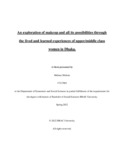| dc.contributor.advisor | Sabur, Seuty | |
| dc.contributor.author | Mohsin, Mehnaz | |
| dc.date.accessioned | 2023-05-07T10:23:34Z | |
| dc.date.available | 2023-05-07T10:23:34Z | |
| dc.date.copyright | 2022 | |
| dc.date.issued | 2022 | |
| dc.identifier.other | ID 17217003 | |
| dc.identifier.uri | http://hdl.handle.net/10361/18228 | |
| dc.description | This thesis is submitted in a partial fulfillment of the requirements for the degree of Bachelor of Social Sciences in Economics, 2022. | en_US |
| dc.description | Cataloged from PDF version of thesis. | |
| dc.description | Includes bibliographical references (pages 18-20). | |
| dc.description.abstract | This paper aims to dive into the makings of a makeup culture among women from upper/middle groups as learned through online sources. This culture has shaped consumer patterns, class identity and superiority and has contributed to the construction of a community. One such that includes routines and rituals, must haves and cannot live without, aesthetic preferences, creating and abiding with class identity that dictates good tastes and the undesirable. This education also expands to specific lingo as cultural capital, allowing for class solidarity in technique, language and products. This culture of makeup is central to transnational exchange of ideas, transforming markets that require digital marketing and beauty influencers in the local scenario to make it accessible. It has also made room for politicized conservations and sensitization through makeup. The political correctness of mis/matched foundations is an extremely charged conversation found in beauty content online, that has allowed for the unlearning and acknowledgment of colored bigotry. This makeup education from online sources has also enabled LGBTQ sensitization among heterosexual viewers from the intersection of makeup, recognizing that a lot of the culture is appropriated from LGBTQ techniques and artistry. This has expanded in the understanding of gender fluidity and normalization of makeup as gender neutral. Respecting and admiring gender diverse beauty gurus while living in a predominantly hetero-oriented society is a phenomenon that has become possible through the exposure to makeup culture online. | en_US |
| dc.description.statementofresponsibility | Mehnaz Mohsin | |
| dc.format.extent | 20 pages | |
| dc.format.extent | 20 pages | |
| dc.language.iso | en | en_US |
| dc.publisher | Brac University | en_US |
| dc.rights | Brac University theses reports are protected by copyright. They may be viewed from this source for any purpose, but reproduction or distribution in any format is prohibited without written permission. | |
| dc.subject | Middle class women | en_US |
| dc.subject | Upper class women | en_US |
| dc.subject | LGBTQ | en_US |
| dc.subject.lcsh | Women | |
| dc.title | An exploration of makeup and all its possibilities through the lived and learned experiences of upper/middle class women in Dhaka | en_US |
| dc.type | Thesis | en_US |
| dc.contributor.department | Department of Economics and Social Sciences, Brac University | |
| dc.description.degree | B. Economics | |

